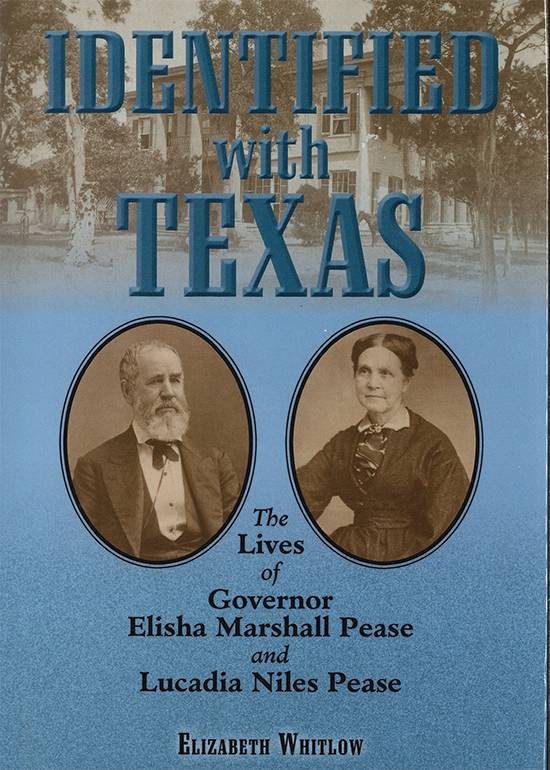More, Please, Please!

Identified with Texas:
The Lives of Governor Elisha Marshall Pease and Lucadia Niles Pease
by Elizabeth Whitlow
Denton: University of North Texas Press, 2021.
405 pp. $45.00 hardcover
Reviewed By
Amy Bushong
A standout piece of Texas historiography, Identified with Texas by Elizabeth Whitlow carefully pieces together the lives of Elisha Marshall Pease and his wife, Lucadia Niles Pease, into a captivating biography of an oft overlooked governor and the woman supporting him. While there is ample time spent discussing the political nuances of Pease’s career, the soul of the book is the love story between E. M. and Lucadia, which offers a lightness and humanizing element to the biography. A longtime scholar of history, the author expertly navigates the treacherous waters of presenting the first biography of Governor Pease. Utilizing primary documents such as personal letters written by and about her subjects, Whitlow sets the scene of the social, domestic, and political landscape.
The book contains incredibly detailed accounts of the early years of Texas politics, spanning from early 1830s all the way to the 1900s. Beginning with Pease’s arrival in Texas prior to the war with Mexico, the author takes special care to situate her subject without overwhelming the reader with historical context. Major figures such as Sam Houston and Stephen F. Austin are briefly mentioned, with much of the focus being Pease’s role in the war. This prevents Whitlow from falling into a well-worn groove in Texas historiography and keeps the reader engaged in a less glamorous, yet equally important political figure. A frequently explored subject throughout the work is the status of public education and the expansion of railways, fashioning E. M. Pease into a champion for modernization. In fact, the early terms of his governorship is characterized as establishing the foundations of systems still used today.
An unusual and delightfully refreshing aspect of the work is the attention paid to L.N. Pease and her life before, during, and after becoming the future governor’s wife. Presented as an independent, highly intellectual person, Whitlow effectively quotes various letters to provide readers with an intimate portrait of a woman who lived two centuries ago. While most of the work focuses on L.N.'s life during marriage, a good portion of the text is devoted to her journey south from Connecticut and her passion for schooling, which was relatively unusual for a woman during the early nineteenth century. Additionally, the importance of her role as matriarch is very well established later in the book and highlights the innumerable ways men relied on their spouses for domestic labor during the nineteenth century. However, the most striking part of the book is Lucadia’s presence at all. While much of Texas historiography focuses on the various roles men played in the fashioning of the country and state, Whitlow makes an interesting departure by choosing to place importance on Texas women in conjunction with men.
The language utilized by Whitlow throughout the work is absent of jargon, another refreshing departure from classic academia. The book reads as if your favorite aunt is telling you about a long-forgotten piece of your own family history, with E.M. and L.N. humanized and spoken of lovingly. The largest snag in this dream dual biography is the Pease’s participation in the institution of slavery and the enslaved people kept on the Pease property. This subject is treated oddly, with Whitlow condemning slavery while also appearing to attempt to rehabilitate the Pease’s image by explaining this benign relationship between master and enslaved person. While this may be due to the nature of biography and the need to hone on a particular focus, the absence of deeper analysis on racial relations in the South before, during, and after the Civil War was jarring.
Overall, Identified with Texas: The Lives of Governor Elisha Marshall Pease and Lucadia Niles Pease by Elizabeth Whitlow serves as an excellent addition to Texas historiography. The choice to highlight a lesser-known governor is interesting, but the inclusion of his wife and domestic life is what truly sets this work apart from traditional biographies.
Amy Bushong is a History MA candidate at Texas State University with a focus in historicizing popular culture. She currently resides in San Marcos with her partner and her cat, Bonnie Tyler.
